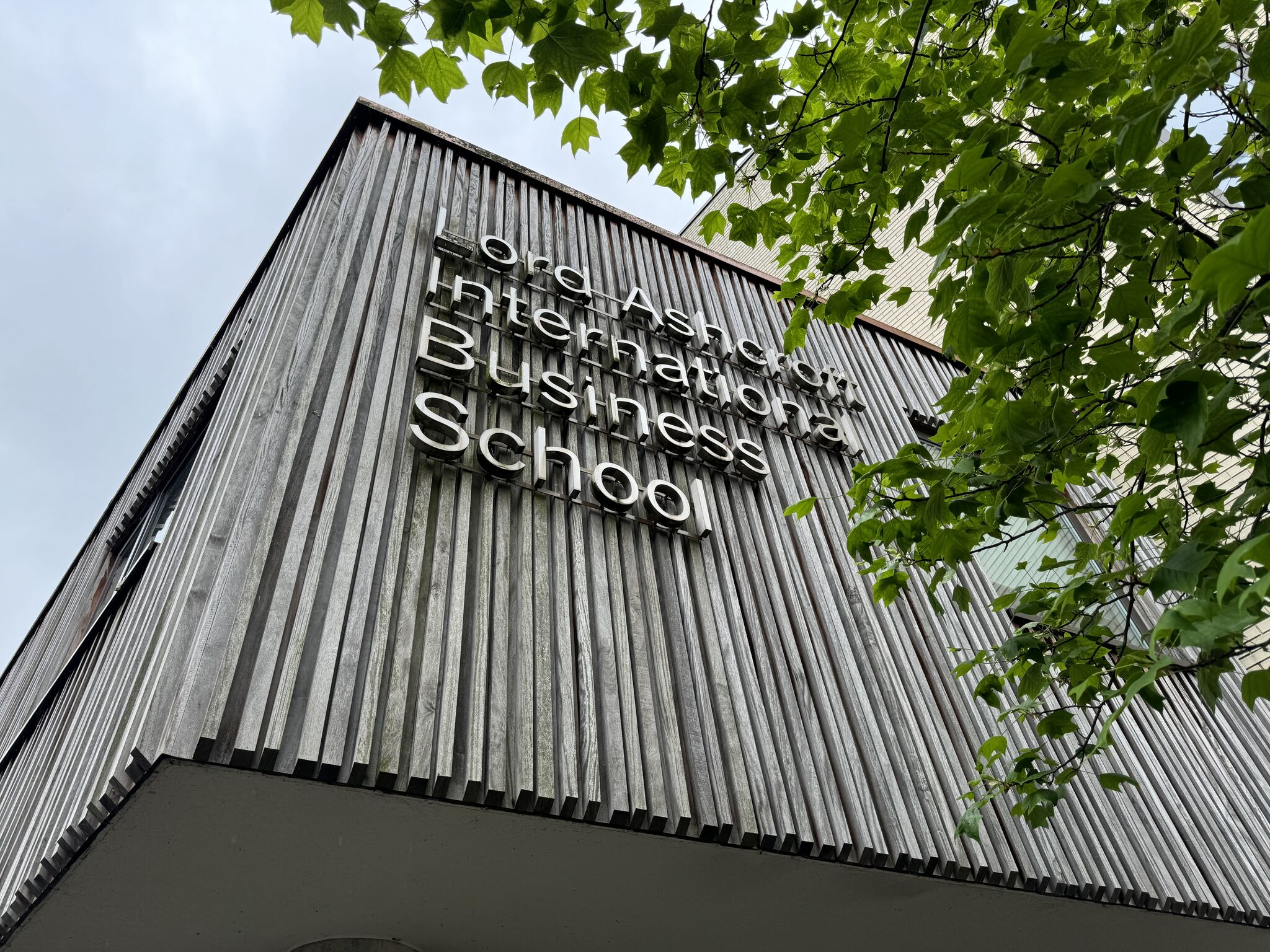
Yvonne Barnett, Deputy Vice Chancellor (Research and Innovation) at Anglia Ruskin University.
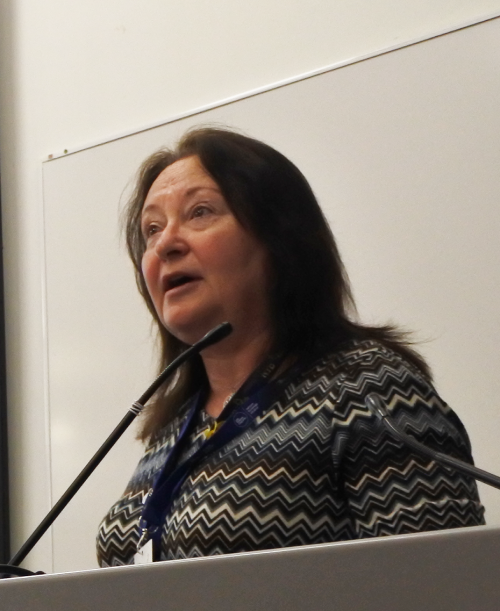
For it’s 6th annual conference, Bio Integrates brings conversations that shape the sector to Anglia Ruskin University in Cambridge. Hosting 250 participants from across Europe’s biotechnology sector, Bio Integrates secures its position as the must-attend event for senior leaders from industry, academia, government and regulators; providing them with unique opportunities to be part of the conversations that set out the industry’s challenges and identify effective strategies and solutions.
In her introductory note Yvonne Barnett says “The advice, support and deep enriched conversations that we’ll have around the two main themes of today will really be worth engaging, the lessons learned and messages to take home to your colleagues “.
She thanked the sponsors and event partners for their contributions to the day. On bringing the event to Cambridge, Yvonne says “We are so proud to work in and to contribute to the growth of this globally leading biotech, life, and health sciences ecosystem here in Cambridge.” She went on to talk about the history of Anglia Ruskin University, the contributions to science made in Cambridge, emphasising the collaboration and partnerships that make them happen.
“We don’t work alone”
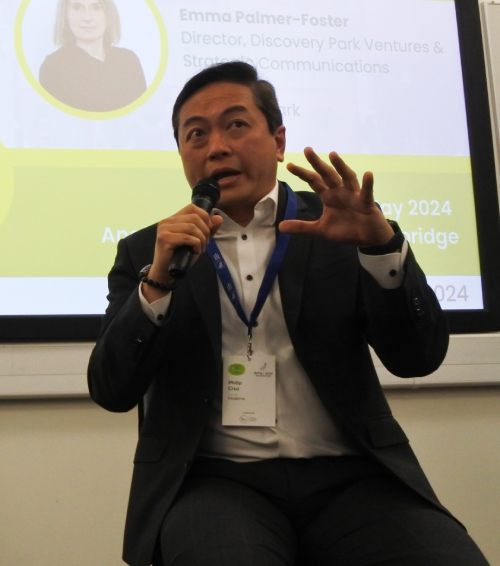
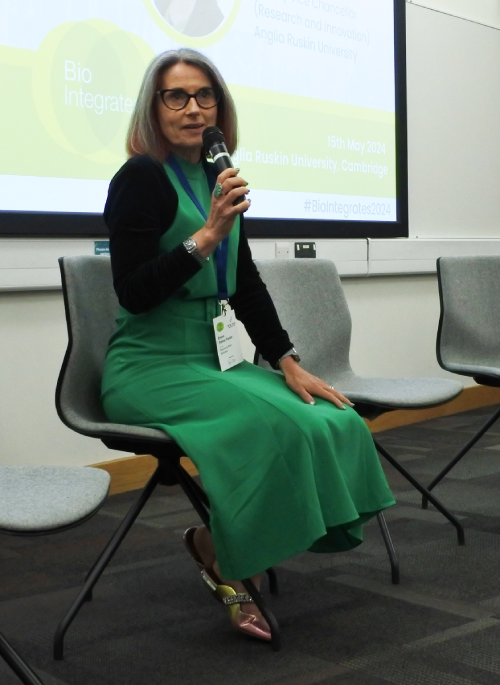
The first fireside chat for Bio Integrates featured Dr Philip Cruz, Country Medical Director UK at Moderna, interviewed by Emma Palmer Foster. Philip began his talk by giving a history of his 15-year career, a paediatrician by training, he is actively involved in clinical research, research and development and pharmaceutical medicine. He worked at GSK Vaccines for over 11 years, eventually assuming the role of Vaccines Medical Director for the UK and Ireland. He has a breadth of experience in clinical development and continues his involvement in clinical trials as a local medical lead. His role as an ABPI final signatory has given him established knowledge in medical governance and he has extensive experience in pharmaceutical medical affairs.
He spoke about his experience in the Covid-19 pandemic, about how the partnership with the MHRA made it possible to come up with a vaccine in less than a year, he said “this is the success story”.
Philip also spoke about the difficulties of delivering science during the pandemic and the learnings in the industry. He said, “the next pandemic will be easier from a logistics standpoint as on-shore manufacturing capabilities and managing the supply chain was a major learning from covid.” He also spoke about on learning to speak with the MHRA at the earliest stage and the developments being made from the RNA vaccine discovery are being continued. He spoke about how in his view, “we shouldn’t just be working to increase a lifespan – we should be focusing on increasing a health-span”
To finish his talk, he gave some advice to delegates, “networking is always good, learning from each other and seeing where we can collaborate.” “Collaboration is a win for science”
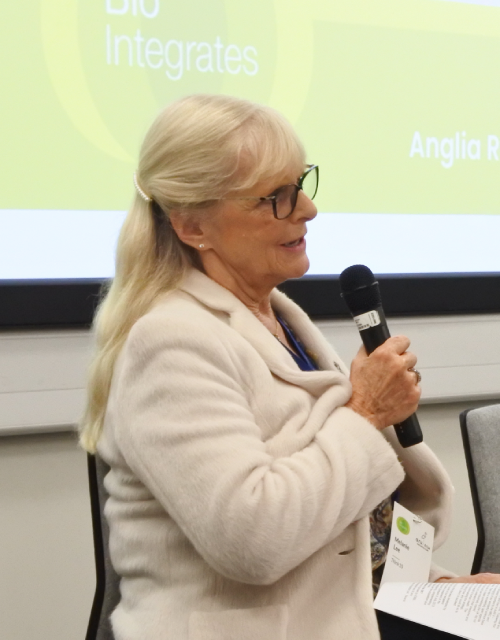
The second fireside chat for Bio Integrates featured Melanie Lee, who is a seasoned Executive and Non-Executive Director across Pharma and Medtech companies, including FTSE 100 biotech, large public and small venture backed boards. She has a strong background in corporate development of strategy in public and private companies to their next phase of growth and is widely connected across the global healthcare sector.
Melanie works through her own consultancy, Think-10, to provide support and advice to the life sciences sector and to bridge the generational divide to listen to young entrepreneurs to achieve their potential and bring through new life changing technologies to maximise patient wellbeing. She joined us for the fireside chat to speak about her experiences in building high performance executive and leadership teams to deliver on ambitious strategies for their organisation.
Talking about how to start when entering an organisation to begin the transformational journey she gave the advice, “first you have to have enthusiasm for the area, and you have to galvanise the team that already exists. You cannot throw out all of the work that has been done previously and you must work with the existing executive team to decide on a strategy.” She considers the ‘how’ and ‘who’ to be the hardest part of creating transformational change. She said, “you cannot do it only in part of the organization, change must be fully supported from the top and full breadth. Need to get that alignment, and communication throughout organization so that people feel secure by building a team with the confidence to withstand change”
“You have to like the science, but you have to like people”
Melanie then moved on to where she thinks the work needs to be done. She spoke about the need for the industry to do better to develop solutions that help the NHS and the need to involve patients by putting them at the centre of data management and analysis. Particularly in building trust with patients so that they feel comfortable with data sharing and can see the benefits in their care from that.
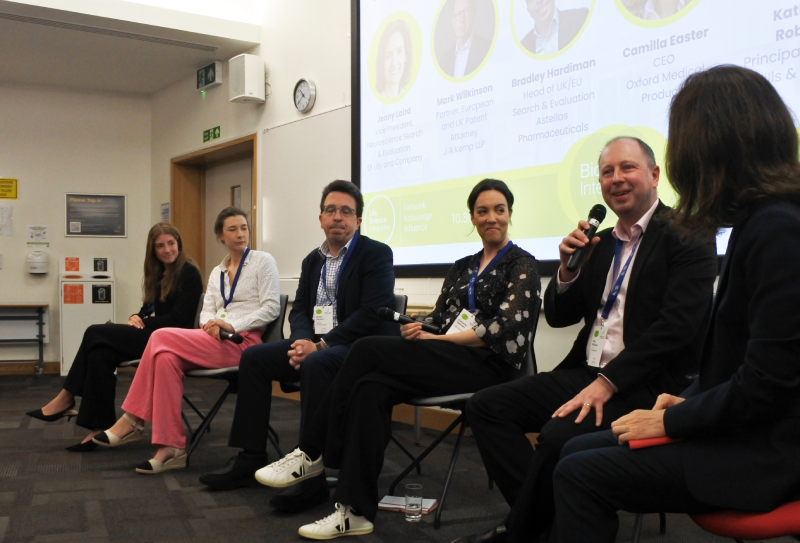
In a competitive market, how do you stand out to attract investors? Facilitated by Jenny Laird, Vice President, Neuroscience Search & Evaluation at Eli Lilly and Company, ‘Money in, Money Out’ answered the question; How can your IP strategy enable you to gain market share, attract more investments, and create a meaningful ROI?
Jenny began the panel by discussing the importance of identifying the investor audience you want to attract and talk to, “Pharma is a very different audience to broad portfolio investors, they will already understand the proposition. You must be able to pitch the conversation appropriately.”
The panel then spoke about their perspectives on what makes a company attractive to investors. Camilla Easter, CEO of Oxford Medical Products, spoke about the importance of having a strong team, “Find the investors that believe in the team, when raising pre-seed need to be thinking about the next raise as that will only get you so far. Think about what they want from you”. On attracting investors specifically in the biotech sector, Alex Brown, Sr. Investment Associate at 24Harmarket said “generalist fund needs scientific validation needed, it helps us say yes”
Continuing the conversation, Mark Wilkinson, Partner, European and UK Patent Attorney at JA Kemp, then addressed three themes to focus on when developing an IP strategy that attracts investors for his perspective as a patent attorney. “What are you doing to build your IP protection? Keep in mind your freedom to operate and understand how you fit in with third party IP rights and potential licensing in the future. And scope out your competitors and what they’re doing. Those three themes will be what investors are looking at.”
From an investor’s perspective Bradley Hardiman, Head of UK/EU Search & Evaluation at Astellas Pharmaceuticals, affirmed this saying “everything pulls on limited resources in the early stages – a bad IP strategy will make us say no.”
Katherine Robinson, Principal Associate at Mills &Reeve LLP then spoke on how to prioritise using limited resources saying “every penny really counts. IP, licenses pinned down and documented if you rely on this, key personnel pinned down – these are the two main things.”
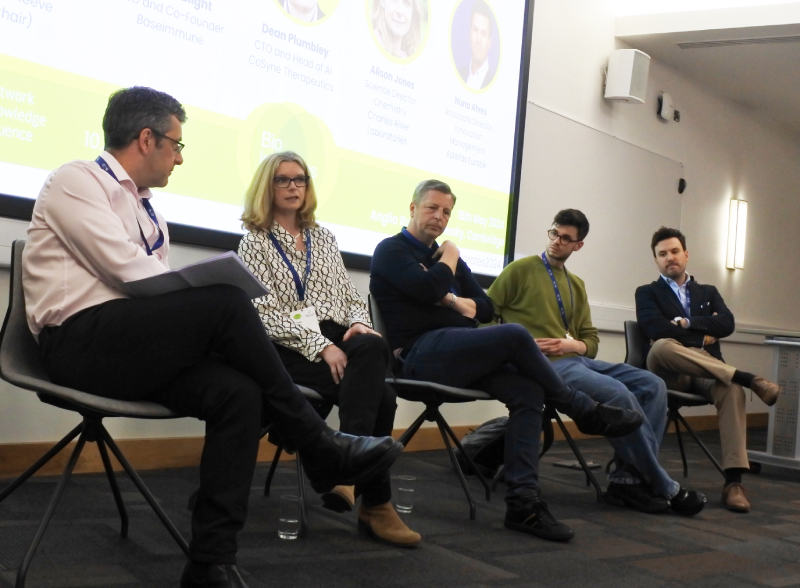
AI is very much a buzzword across industries, including the biotech industry. The second Bio Integrates panel facilitated by James Fry, Partner and Head of Life Sciences at Mills & Reeve, asked the question; what are we talking about in the context of AI? How is AI being used usefully in the biotech industry? And what are the major challenges with using AI?
The panellists began by discussing how is AI is currently used in the industry, CEO and Co-founder of Base Immune, Joshua Blight said ““Ai is not a solution to everything but it is definitely a tool”
Following from this, Richard Vellacott, CEO of BiologIC Technologies, elaborated “as scientists we’re used to working in a box, but by working in platforms and where AI is interesting is that now we can start solving interconnected problems by changing parameters’
The panel also spoke of how AI is being used. Alison Jones, Science Director, Chemistry at Charles River Laboratories, highlighted from her own experience the impact that technologies like Alpha Fold have had on small molecule drug discovery. She however cautioned,” You have to integrate your data – data and AI go hand in hand and you have to intentionally choose the right model of your question.”
Richard also emphasized this concern “I worry that in R&D is that the quality of data is paramount.” “Poor adoption is happening in process control and manufacturing because there is a small amount of data”
To finish James asked the panel their top tips to using AI. In his advice for choosing when to use AI, Nuno Alves said “can we do it faster, better, cheaper – that’s what I see is needed from a disruptive technology”. Richard said “ Why are formula 1 so good at using sims? Because the one goal they have is to win the race – the problem in biotech companies is that they often don’t know what race they want to win”. Giving her top tip to companies hesitant to implement AI, Alison said “Have an intentional data and AI strategy. Ai is a co-pilot and is nothing to be scared of.”
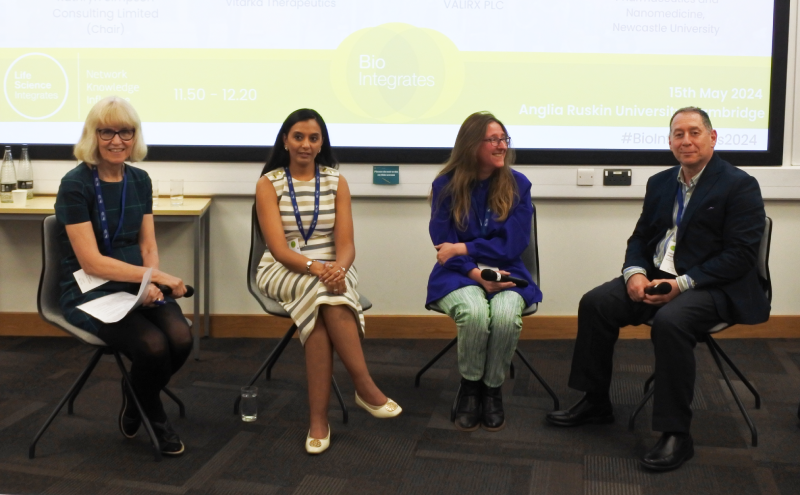
As biotech products become increasingly innovative, it’s essential to engage with regulators. Panellist on ‘Removing the ‘late’ from ‘regulate’ chaired by Kathryn Simpson, Business Consultant at Kathryn Simpson Consulting Limited, answered the question – how can engaging with regulators early and often help you overcome hurdles, understand data requirements, and maximise the benefits of innovation?
From the beginning, the panel all emphasised the importance of engaging with regulatory authorities as early as possible. From her vast experience of working on completing commercial transactions to progress projects with multiple companies, Suzanne Dilly, CEO of ValiRX said “A small virtual biotech has very limited resources. It’s not cheap to engage with regulators, both in money and time. You have to be fully committed to your project and you need the science to work to be fully committed.” She followed up with the advice “But to do the right science you need to engage with the regulators to ask the right questions. It’s worth the resource to engage early in order to make sure that the right information is there down the line. You need to be asking the right questions to make sure the regulators put the right people in the meeting to get the answers you need.”
Adding to Suzanne’s advice, Vineeta Tripathi, CEO and Chief Scientific Officer of Vitarka Therapeutics said “For startups one of the jobs of the CEO is fundraising which can be very tough. It can be easy to forget about the main priority which is getting the drug to the clinic. Sometimes companies are worried about engaging with regulators early as they’re worried the data might kill the project – but the opposite is true. It’s all about paving the way and de-risking your development by engaging with the regulator as early as possible and starting with the end in mind. This is really important for investors too.”
From an academic perspective, Moein Moghimi, Professor of Pharmaceutics and Nanomedicine at Newcastle University said “The most important thing is experience. There is a big difference between discovery and development. You could have fantastic science but not get anywhere during development because of choosing the wrong formulation. You need to engage with the experts early to benefit from their experience in how to make this discovery into a viable formulation that will pass the regulatory hurdles.”
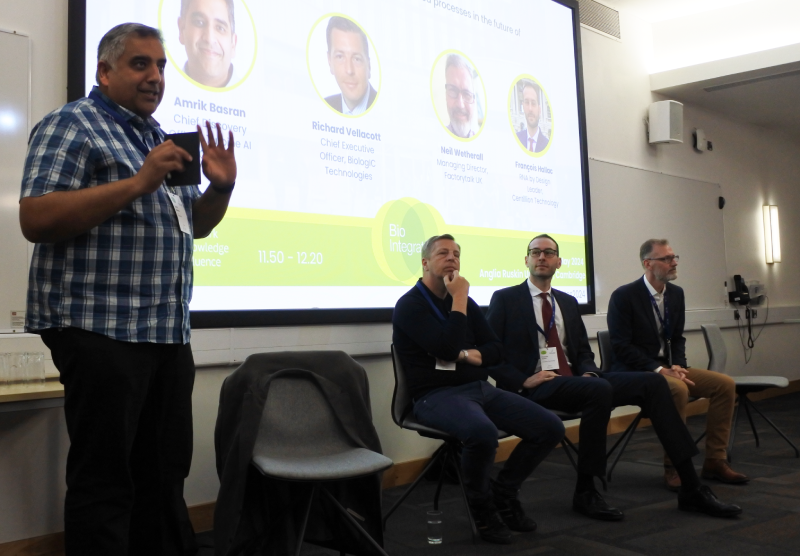
New technologies enable drugs to be manufactured more efficiently, more compliantly, and at a lower cost. Panellists on ‘From Lab to large scale’ answer the question, what is the role of advanced, automated, data-controlled processes in the future of biopharmaceutical manufacturing?
Facilitator Amrik Basran, Chief Discovery Officer of Turbine AI, began the fourth session of Bio Integrates by introducing his own experience in the drug discovery space and the development novel biological platforms to address disease targets in a wide range of settings.
Richard Vellacott, CEO of BiologIC Technologies, spoke next on what he thought the biggest challenges in upscaling discoveries. “Some of the challenges we see with traditional manufacturing is that instrumentation on which people perform the research and development and then move for process development and then move to manufacturing is all differently. And lots of large-scale manufacturing equipment frankly is borrowed from large scale chemistry bulk manufacturing, and it’s not necessarily optimised to biological products.”
He then continued explaining “you end up in an arm wrestle in tech transfer between the people that originated the biologics in the first place and believe they know the conditions which it can be made versus the manufacturers who have a platform thtat they can’t change. So who’s going to win, ultimately its the manufacturers because there is so much capital invested in the infrastructure, you are going to have to bend your biology to fit that platform.”
Amrik added “we are seeing especially if we take for example cellular therapy, people are really moving into democratizing that investment, decentralizing it from large manufacturing.”
Centillion Technology’s RNA by Design Leader, François Hallac, spoke about how they are addressing the challenge of making downscale design more flexible and more modular. He said, “every time you have to transfer from one process to another you expose your product, there’s a risk of contamination, not to mention the time it take and the equipment footprint. At the moment if you want to produce a vaccine that will go into human, you need a massive space. You cannot do it in very small equipment, and this is where our approach is. We want to do it in a continuous fashion and automate it from end to end, from the plasmid DNA through the drug substance to the drug product if needed, that is the basis of our plasmid technology.
From the manufacturing perspective of the conversation, Neil Wetherall, Managing Director of Factorytalk UK, spoke about the differences in approach from the other members of the panel. He said “you guys are trying to move the industry towards technology platforms to build the new products. My world sadly is in the old world of we have the technology, the hardware we have”. Explaining why it can be so difficult to introduce a digital platform that can collect data right from R&D all the way up the scale, he said “there is a desire to go away from paper, but sadly a lot of my world is going around factories and most of those have oodles of paper, particularly batch records that are still on paper. Even, you know companies like AstraZeneca across the city who who are one of my major clients, they have a strategic platform for batch electronic batch records but it is only on the key global manufacturing sites, small sites don’t have anything.”
Using Factorytalk’s work as an example he said, “what is the question you’re trying to answer, knowing that and then starting to gather that data such that over time ,it will take a long time, we will start to have the data that you can perhaps use with AI. But we don’t have any data at all yet, the old adage, if it’s on paper, it’s not data. that is absolutely true in most of the pharma manufacturing industry and actually in labs too.” Agreeing Amrik said, “There is so much positive data and negative data that actually is useful but if it’s all just on paper or even even if it is digital but on platforms that are not accessible by software or can span from early research into the late stage process developments. It becomes quite difficult to know the data, and the information that you could use for improvements, but how would you access that?”
Concluding the panel, Richard summed up the importance of integration and the approaches talked about in the panel. He said “Traditionally these problems have been solved sequentially that we might get data for one element of this workflow which maybe it’s upstream, we’re cloning different chose cell lines and then we’re going to rank them and we get some ranking data. The problem is that actually this end to end workflow is interdependent that the parameters that change upstream are going to have an effect on the quality attribute downstream. And so if you do not holistically solve this problem by looking at all the interdependent parameters and how we maintain this quality profile to get to a target product at the end, if you don’t solve that holistically, it takes an awful long time.”
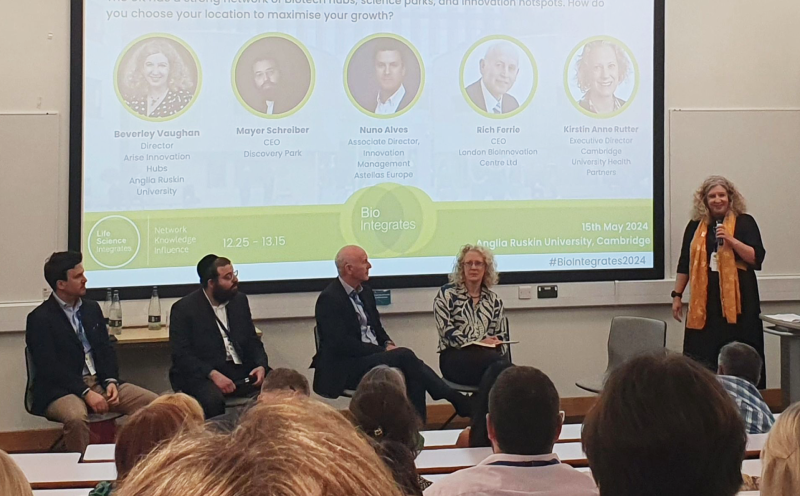
‘The place to be’ panel focused on how the importance of choosing the best location in the to maximise company and wider biotech growth. The UK has a strong network of biotech hubs, science parks, and innovation hotspots, chaired by Beverley Vaughan, Director of Arise Innovation Hubs, panellists explored the strengths of the innovation hubs around the UK, what to prioritise when choosing the right location and the need to develop and grow innovation corridors between hubs.
Beverley began the panel by establishing the context of the panel. “The second question we ask when we meet someone is where are you from? The importance of location is also true of where you base yourself for your 9-5 and choosing the right location for your company is a challenge.”
Collaboration between clusters is vital in creating innovation corridors, thus furthering the United Kingdom as a ‘science superpower.’ There is great science going on everywhere – imagine the strength in joined forces!
On the importance of having hubs around the UK, Mayer Schreiber, CEO of Discovery Park said “Clusters are important both in challenging economic times and in economic booms. They help to boost productivity due to increased collaboration and stimulate innovation as companies can share resources and talent. Following the 2008 financial crash we saw that Silicon Valley had developed resilience and was able to weather the challenges due to the benefits of this cluster. In economic booms, clusters are well suited to attract investment and deliver the infrastructure needed for business success.”
The panel also discussed the important factors to consider when selecting a location that will aid economic growth in the biotech sector; these include lab costs, cost of living, access to talent, work life balance, access to investment, and access to support networks. Nuno Alves, Associate Director, Innovation Management at Astellas Europe, spoke about the priorities his company had in setting up a European office. “For a Japanese company looking to set up a new European office, the UK and more specifically within the golden triangle, offered access to universities, science parks, VCs, and wider transport links that make it a fantastic access point to innovation… the priorities are access to innovation and talent, and proximity to universities is important for both of these.”
On access and a close relationship with universities, Kristen Anne Rutter, Executive Director of Cambridge University Health Partners said, “Universities are the John Lewis of a shopping mall, you need these kinds of anchors to thrive. The talent and ideas that come out of universities is what investors want to see, a flow of science and ideas. Universities can afford to take risks due to funding model.”
Rich Ferrie, Chief Executive Officer of London Bioscience Innovation Centre (LBIC), also highlighted how important hubs are for growing businesses. He said, “Proximity is key for collaboration, inverse square law”.
To finish the panel focused on the idea of collaboration between clusters, how vital it is in the future to create innovation corridors, thus furthering the United Kingdom as a ‘science superpower.’
Beverley Vaughan summed this up with, “There is great science going on everywhere – imagine the strength in joined forces!”
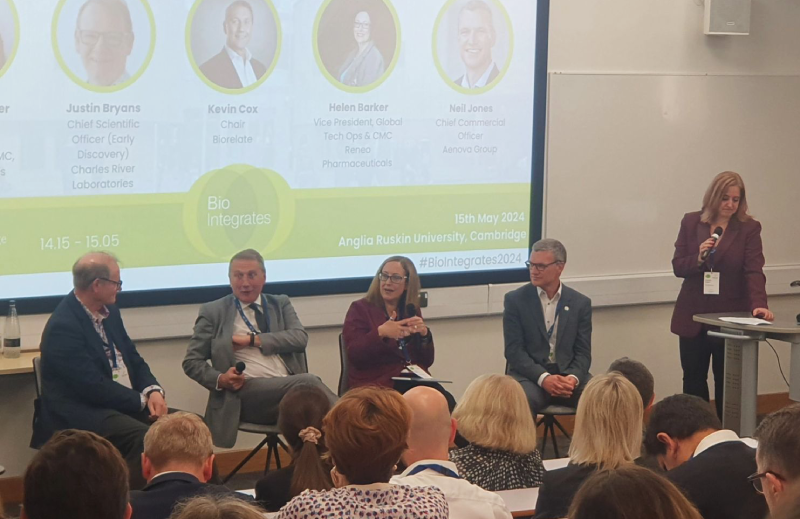
Chair, Nathalie Huther, Associate VP Business Development, CMC, for Sai Life Sciences, began the panel by discussing why ‘Productive Partnerships’ is so relevant to the current industry. She said, “current market research shows that most innovation in the sector is coming from small biotech and emerging virtual companies, in the next two years its predicted that 60% of biopharmaceutical growth will come from emerging companies. But we all know they possess little to no scale capability in house. This is where the CMO market comes in.”
The panel then each shared what they thought were the key elements of a successful partnership between biotech and CDMO. Neil Jones, Chief Commercial Officer at Aenova, started with, “what makes us successful partnership varies with every different partner that you’re working with, it’s about understanding what they want to get out of the relationship and what you want to get out of the relationship and finding the point where you meet in the middle.”
Helen Barker, Vice President, Global Tech Ops & CMC at Reneo Pharmaceuticals said “it really is about selecting right people for where you are in your development paradigm, so if I’m just wanting to sort piece of work at the beginning of a new molecule coming in versus I’m getting something ready for commercialization, two different types of relationships, different types of company”
On the other hand, Kevin Cox, Chair of Biorelate, disagreed and said “I don’t believe in partnerships.” He explained “I think partnerships is an overused word… I think what we have to recognise is a spectrum. One end of the spectrum we have these purely transactional relationships were all managed by contracts and the other end we have partnerships, which is partnerships for me. We share risk, we share reward. So when building a relationship with a company its about understanding where those risks are, what risks each party is going to take, understanding what reward each party will take and understanding the complementary skills. So what you’re doing is identifying how working together creates more than individual components.”
To summarise Justin Bryans, Chief Scientific Officer (Early Discovery) at Charles River Laboratories, said “engage as early as possible – if you’ve got an idea, it’s better to speak to someone who understands to help you shape your idea. You don’t have to commit to any work. Over 80% of business comes from repeat business – clients are likely to stick with someone you trust. Make sure you’re working with the right partner for what you need.”
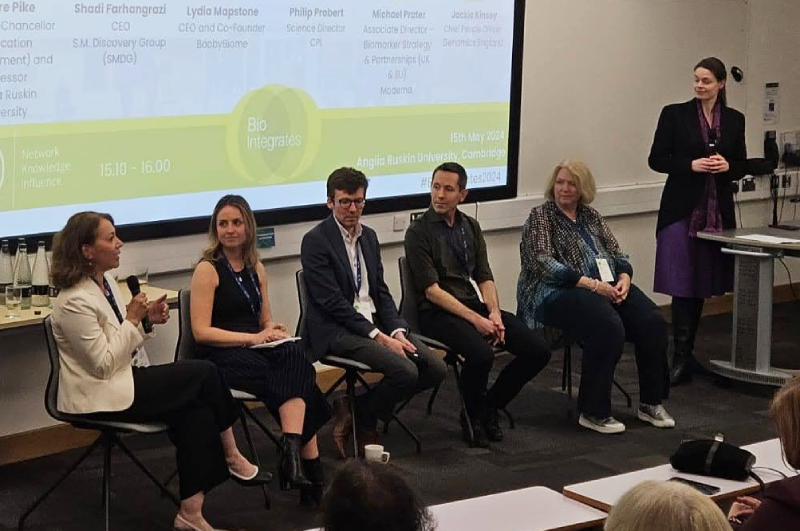
The final session for Bio Integrates was ‘the workforce of the future’ panel, chaired by Claire Pike, Pro Vice-Chancellor (Education Enhancement) and Professor at Anglia Ruskin University, started with panellists giving their own experiences of building a strong team and what they thought was key to developing this.
On key skills, Philip Probert, Biologics Technology Lead at CPI, said, “Similar to small companies, we need people who can wear a lot of hats as we’re project based and will need to pivot in between projects. But as a larger organization, we also need to look at retention and talent pathways. The three most important attributes are people who are communicative, collaborative, and responsive.” He however highlighted what he felt was a gap. “We have a talent shortage, so there is a lot of need to grow talent internally. Collaboration between education and industry is vital to make sure people receive the right training.”
Following on Michael Prater, Associate Director – Biomarker Strategy & Partnerships (UK & EU) at Moderna, spoke on how to build the three attributes that Philip mentioned, “Being part of a startup is a fantastic way to learn many different parts of a business. People must adapt, chip in and learn. This was a critical part of my career development and strengthened my skills when moving into a bigger organization.”
On closing a talent gap, Jackie Kinsey, Chief People Officer at Genomics England, spoke about the importance of developing a talent base. “As an organization thinking about the complexity of the talent base, it’s important to give people career pathways that enable them to specialize, but also think about different pathways if they wanted to change their area, transition to different disciplines. We need to put the pathways in place to support this.”
She also spoke about the challenge of preparing people for jobs that at the moment, don’t exist. “We need to break down the skills and make sure courses cover a broad basis of skills.”
Shadi Farhangrazi, Chief Executive Officer at S.M. Discovery Group (SMDG), agreed and called for multidisciplinary skills. “We need people to wear a number of different hats. We need people who know the science really well but what we’re missing is the overlap between science and business”
While the panel had majority the same views there was also a question about the practicalities of training the workforce of the future. Lydia Mapstone, Chief Executive Officer and Co-founder of BoobyBiome, said, “while we need to develop other skills such as debating, statistics, commercial mindset etc, and there are good examples of how you can do this, but startups can’t afford to set up these programmes.”
To conclude Claire Pike said, “Excellent input from across spectrum of industry. Flexibility, agility and transferable skills are common across all areas – and there is a lot of benefit from partnership between academia and industry.”
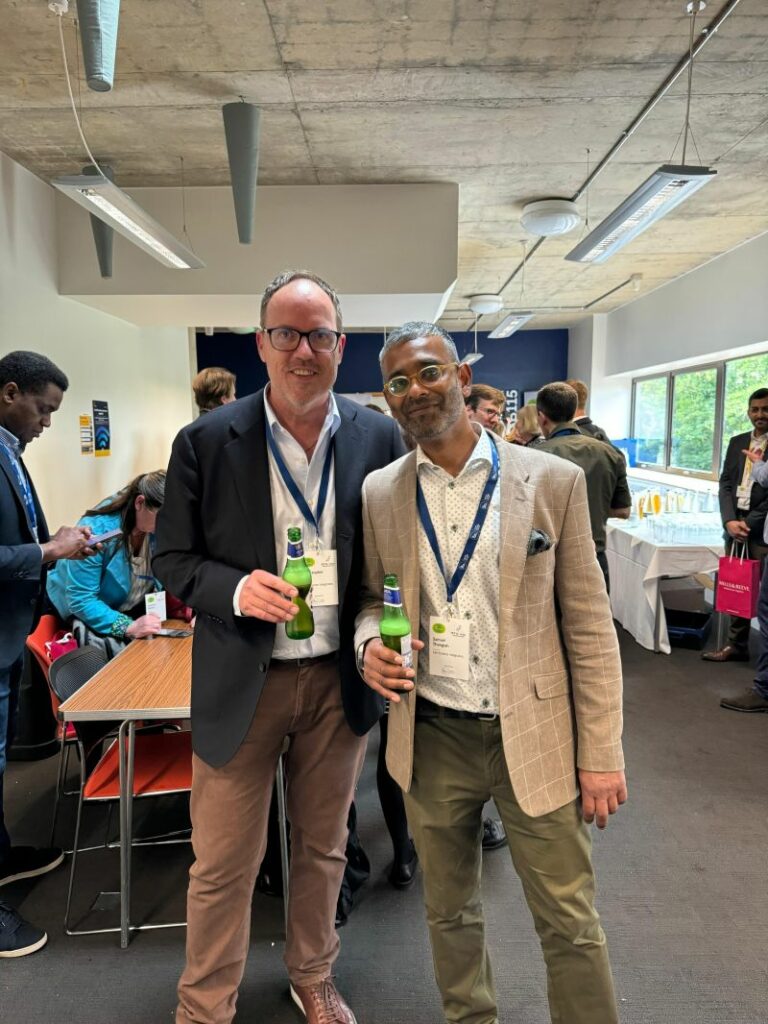
Samuel Thangiah, Co-Founder & Executive Director of Life Science Integrates said:
“It has been a wonderful day bringing together over 250 attendees from across the biotech community for the first time in Cambridge for Bio Integrates. The calibre of speakers, panel topics and attendees reflects the importance of events like this one for the sector”
Christopher Watt, Co-Founder & Executive Director, Life Science Integrates added, “today has been a huge success, facilitating a diverse range of speakers, sponsors, and participants coming together to share ideas, forge new connections and create a fully integrated biotech ecosystem”
Thank you to hosts, sponsors, partners and speakers who have made Bio Integrates 2024 possible, and we look forward to having everybody back next year.
